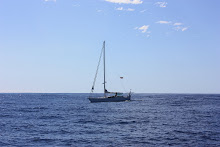Five minute on the environment. Sounds like world news in 2 minutes, or 'round the world in a day.
How much do you get?
So, I'll have to slice this into sub-topics again if I want to make my point clear.
We used to call this "nature", probably because there was still such a thing. We saw it as separate from us, like a shared rental: on one side, there was nature, living it's life, on the other, us living ours.
As we grew and multiplied, and as we developed technology to make use of our friendly neighbor, nature became the environment, something that is around us, but not different from us. Actually something that must be used (abused), that is there for us.
The concept already is shocking. It means that as the dominant life form on the planet (for how long?), we have every right to consider that everything not human must serve humanity. A little like Indians in the Western US owned the land, but served no purpose other than to be destroyed to gain the land and resources (a very good book on the topic is "I buried my heart in Wounded Knee", highly recommended).
So anyway, now it's called the environment, and more and more concern is expressed in various quarters about what humanity is doing to it (by the way, this is a recent thing, when I was younger, NOBODY talked about it). Looking from a high flying aircraft, human invasion looks like a cancer, concrete everywhere, roads, houses, cities, even the countryside in many places look like checkerboards, fields all nice and square and the odd farm in the middle. At night, our planet looks like a Christmas tree seen from space. Space itself, around our planet, is as congested (in relative terms) as the worst highways on earth.
It is estimated that almost 15% of the earth surface is used now for urban and industrial areas and intensive farming, with another 6 to 7% for "managed" pasture. That's more than 20% of the grand total, folks! And we all heard about how many football fields of primary forest disappears every minute to make room for more fields and pasture land.
And this is only the "blue sky" view (haven't seen a blue sky in some countries for years, it's more like bluish-grey, when it's not outright covered in haze). Looking at the environment from the smaller (!) side, human development has so far lead to a significant reduction in biodiversity, partly because of hunting (gone, the dodo!), largely because of destruction of habitat, and increasingly because of indirect causes like introduction of non-native species, pollution, and possibly climate change. How many species have disappeared is not really known, given that we hardly know all the species there were in the first place, but some scientists call it already the "anthropocene extinction", comparing it with past extinctions related to major climate changes or cataclysmic events of the distant past. Currently there are over 3000 species of animals (and 2600+ species of plants) on the endangered list (IUCN), not counting those we know diddle about.
This is just one angle. Species are living being we tend to care about. Aquifer over-exploitation, topsoil erosion, pollution of the oceans, ever-growing garbage dumps, and many other "environmental impacts" of similar concern, are somewhat less talked about, but are also becoming unmanageable (I don't use the word unsustainable for a reason, we'll get into that later).
Moreover, we are playing apprentice sorcerer in many fields (and I am not a science basher or a skeptic towards the scientific community) in areas like genetic modification, use of hormones, antiseptics or antibiotics, or messing up the food chain by feeding cattle with dead cattle (see the mad cow disease - also called Creutzfeldt Jacob disease). Fact is we don't fully understand what the hell we are doing, and economic pressure reduces the likelihood of wanting to dig deep before using new "fixes". Fukushima is one such example of madness, see ☢ Fukushima: Beyond Urgent ☢ on youtube...
So we are all mad. Or are we?
We are destroying the only planet with chocolate, reducing it's beauty and viability, putting our lives at risk, and more certainly that of our children, mortgaging the future, and crying victory when the newest technology has mastered another bottleneck in our development.
Now the question is "why do we do that"?
Obviously, human population is growing, humans thrive for better living, meaning security (no more large predators taking their nightly prey), assured food (who wants to hunt or fish for the daily ration?), comfort (running water, power, shelter, etc...), and hence not only are the numbers growing, but the overall demand for the satisfaction of the above increases. And the only way out, it seems, is to continue taking what is rightly ours, the dominant species, from the vast resources of our planet. Not that we don't mind that this type of animal or plant disappears, and of course we do mind that we are sawing the branch we are sitting on, both as persons, and as a society.
The problem is, at the same time, we all want child mortality to come down in Africa, we want to cure world diseases, we understand that we can't prohibit development in the third world, and desire shorter work hours in the first world, we want security, social services, good food, a healthy and long life, in a word, we want it all.
OK, more than 5 minutes already. Damn, time flies...
More to come on this topic.
Comments welcome
Cheers
Subscribe to:
Post Comments (Atom)

No comments:
Post a Comment